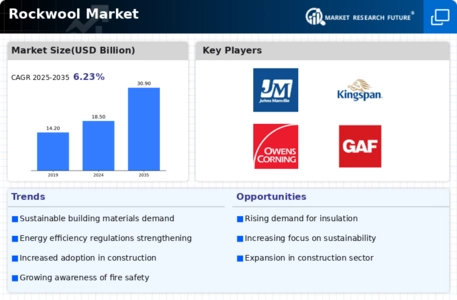Market Analysis
In-depth Analysis of Rockwool Market Industry Landscape
The market dynamics of Rockwool are shaped by various factors influencing the supply, demand, and overall trends within the construction, insulation, and horticultural sectors. Rockwool, also known as mineral wool, is a versatile material made from natural basalt rock and recycled slag. Understanding the market dynamics involves examining elements such as technological advancements, sustainability considerations, regulatory impacts, industry applications, and competitive forces.
Technological advancements play a crucial role in the market dynamics of Rockwool. Ongoing innovations in manufacturing processes, fiberization techniques, and product applications contribute to the development of Rockwool products with enhanced thermal insulation properties, fire resistance, and sound absorption capabilities. Advanced features such as improved compressive strength and water repellency contribute to the versatility of Rockwool, making it a preferred choice for various construction and insulation applications. Manufacturers investing in cutting-edge technologies can gain a competitive edge by offering high-performance Rockwool products that meet the evolving needs of the construction industry.
Sustainability considerations are increasingly influencing the market dynamics of Rockwool. As the construction industry embraces eco-friendly practices, there is a growing demand for insulation materials that are not only effective but also environmentally responsible. Rockwool, being made from natural and abundant resources, is known for its sustainability credentials. Additionally, Rockwool insulation contributes to energy efficiency in buildings, aligning with global efforts to reduce carbon footprints. Manufacturers focusing on sustainable production processes and emphasizing the environmental benefits of Rockwool can capture market share in an environmentally conscious construction sector.
Regulatory impacts, including building codes and energy efficiency standards, significantly influence the market dynamics of Rockwool. Compliance with regulations related to fire safety, thermal performance, and environmental impact is essential for manufacturers to ensure product acceptance and adherence to legal requirements. As building codes evolve to prioritize energy-efficient construction, Rockwool insulation becomes a key component for meeting and exceeding these standards. Staying abreast of changing regulations and certifications is crucial for companies to navigate the complex landscape of Rockwool in the construction industry.
Industry applications significantly impact the market dynamics of Rockwool. The demand for Rockwool insulation is closely tied to its effectiveness in various applications, including residential, commercial, and industrial construction. Rockwool is also widely used in horticulture as a growing medium for hydroponic systems and container gardening. Manufacturers must stay attuned to industry applications and customer requirements to align their product offerings with the diverse needs of users in different sectors.
Challenges within the market dynamics include competition from alternative insulation materials, pricing pressures, and the need for effective marketing. The insulation market is characterized by competition among different materials, and Rockwool faces alternatives such as fiberglass and foam insulation. Pricing considerations are critical, as construction projects often involve budget constraints. Effective marketing strategies that highlight the unique properties of Rockwool, such as its non-combustibility and resistance to moisture, become essential for manufacturers to differentiate their products in a crowded market.
The competitive landscape is a significant aspect influencing the market dynamics of Rockwool. The industry is marked by a diverse range of manufacturers vying for market share, and differentiation is key. Companies strive to distinguish themselves through factors such as insulation performance, product range, sustainability features, and brand reputation. Understanding and adapting to changing construction industry needs, emerging technologies, and customer preferences are essential for success in this competitive market.
Global considerations, including trade dynamics and regional preferences, also impact the market for Rockwool. Manufacturers may need to navigate varying regulations, trade agreements, and construction practices across different regions. Adapting to market dynamics in different parts of the world is crucial for companies aiming to establish a strong and sustainable presence in the global Rockwool market.
















Leave a Comment